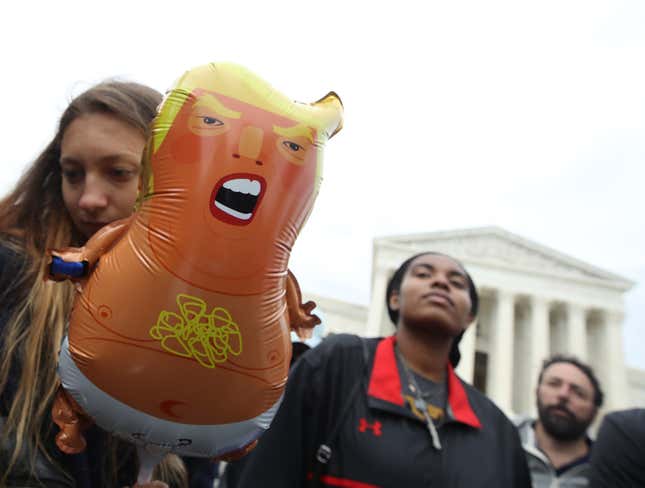
This month, the Supreme Court heard arguments around a case that could transform how businesses across the country handle anti-LGBTQ discrimination. Anyone who purports to care about the black community should be concerned about efforts to ensure equal protection under the law to black LGBTQ+ people, including efforts to question the application of Title VII to the Civil Rights Act of 1964.
Why? Because neither the black community nor the LGBTQ/same gender loving community is a monolith.
Too often, political and social conversations about “identity politics” are conducted in ways that make black people forget that black lesbian, gay, bisexual, transgender, queer and same gender loving people have always existed.
These conversations often get stuck on the surface—in the place where some might reflect on why we should care at all. Someone asked a version of this question during the NAACP National Convention in Detroit: “With all due respect, why would we care about LGBTQ issues when black people still have so much fighting to do?”
There is work to be done within the black community at the intersection of sexual and gender identities and gender expressions. We must address the murders of black trans women. We must respond to the Centers for Disease Control and Prevention’s (CDC) expectation that half of all black same gender loving men will contract HIV in their lifetime. We must address what happens to students, nationwide, who face violent threats and reactions if they identify as anything other than “strictly heterosexual.” This information does not affirm the myth of a homosexual agenda. It does, however, point to the need for black people to address oppression in our own communities, by increasing our vocabulary and engaging in these conversations in more meaningful ways.
Beyond having more meaningful conversations about our diversity, we must ensure that all black people are protected under the law and have access to the same fundamental rights that millions take for granted.
Today, the Supreme Court is hearing arguments regarding a Title VII case that may impact the way employers, empowered to make hiring decisions, operate their businesses.
Title VII of the Civil Rights Act of 1964 prohibits discrimination based upon race, color, religion, sex and national origin. It generally applies to employers with 15 or more employees, including federal, state and local governments. The Supreme Court is considering whether Title VII applies to anti-LGBT discrimination. While the lower courts and the Equal Employment Opportunity Commission (EEOC) recognize that sexual orientation and gender identity discrimination are forms of sex discrimination and thereby prohibited under federal law, the current administration and cases such as Bostock v. Clayton County, GA, have challenged this interpretation.
Black people persistently experience denied access to opportunities in education, public housing, and employment. Although the threat of employment discrimination is not new, legal protection for employers who fire employees based on actual or perceived sexual identity, gender orientation or gender expression takes the founding principles of our democracy several steps backward.
The NAACP and the LGBTQ movement have supported each other since Bayard Rustin planned the March on Washington in 1963. From the NAACP’s support of marriage equality and the Equality Act to recent resolutions supporting the transgender community and including LGBTQ Diversity and Sensitivity Training for NAACP branches nationwide, the NAACP understands that there is nothing more important than affirming our common humanity and fighting for the dignity we all deserve.
We should all be clear that the questions surrounding Title VII, and the SCOTUS decision about its applications, is one in a series of legal and social battles that will answer whether democracy is an opportunity presented to all marginalized groups—from black people to the LGBTQ community to black people in the LGBTQ community—who have contributed to the success of this great country we call home.
As our nation continues to grapple with the vestiges of transatlantic enslavement, white supremacy and anti-blackness we hope that black people do a better job of appreciating that as long as there have been black people there have been Black LGBTQ/SGL people and by extension, caring about “gay issues” is caring about black issues. Until all of us are free to enjoy equal protection under the law, none of us are free.
David J. Johns is the Executive Director of the National Black Justice Coalition, a civil rights organization intentionally and unapologetically at the intersections of racial equity and LGBTQ/SGL equality. The term same gender loving was created to center and celebrate African identity while acknowledging homosexual identity.
Derrick Johnson is the President and CEO of the NAACP, the nation’s oldest and largest nonpartisan civil rights organization. Its members throughout the United States and the world are the premier advocates for civil rights in their communities.

